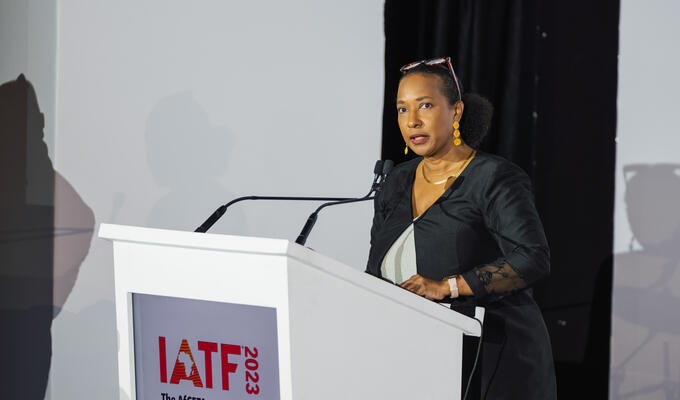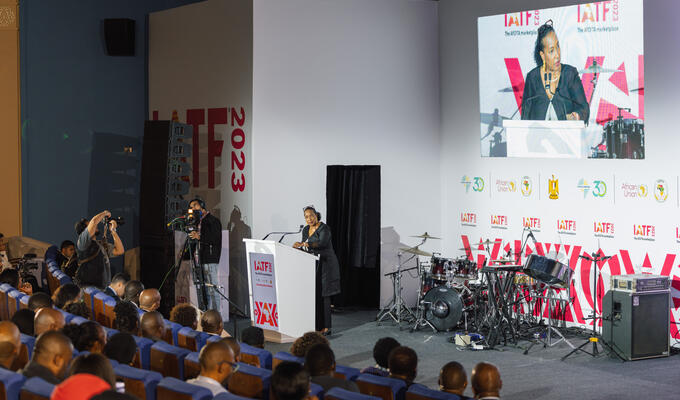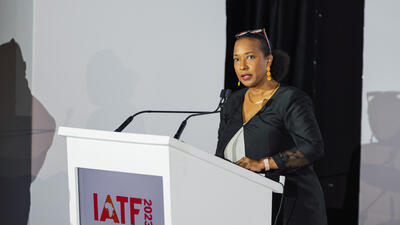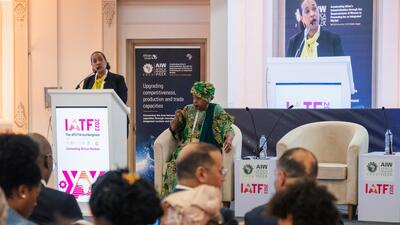


Building an economic bridge between Africa and its diaspora
(Cairo, Egypt) Executive Director delivers her welcoming remarks at the 2023 Intra-African Trade Fair’s Diaspora Day high-level event.
Distinguished guests, ladies and gentlemen, dear friends, thank you for having me today.
I’m honoured to be taking part in the IATF’s Diaspora Day, sitting here alongside so many individuals who have dedicated their time, energy, and hearts to building an economic bridge between Africa and its diaspora.
Two years ago, I stood at the Door of No Return at Cape Coast Castle in Ghana for the first time, looking out over the Gulf of Guinea. It was an experience that will stay with me for the rest of my life: realizing what it looked like for captives to walk through that door, not just from the perspective of those being taken, but also for those left behind.
I’m from Jamaica, and a few years ago I learned that my roots were Nigerian. Growing up in the Caribbean, one of the stories that resonated with me the most was that of Marcus Garvey and the Black Star Line. Garvey, over a century ago, sought to reshape the relationship between Africa and its diaspora around a new approach to trade: one that would finally yield the economic empowerment for Africans and people of African descent that the slave trade and colonial-era structures had long denied.
The horrors of the trans-Atlantic slave trade must never be forgotten. For over four centuries, trade was used as an instrument of evil, of exploitation, of ripping families and communities apart. We see the legacy of this horror every day in the Americas, in the Caribbean, and in Africa. We see it in our economies. We see it in the political and international landscape. We see it in the very social fabric of our communities.
And we are still seeing what it means to have a trading system that has struggled to tackle many longstanding injustices and inequities—including those born out of the most evil approach to trade we have ever known.
But what’s also emerged from that legacy is a story of resilience, creativity, and immense potential for Africa and its diaspora. It’s now time for us to come together and use that potential to write a better story of trade—the story that should have been written hundreds of years ago.
Africa’s diaspora is here, and we’re excited to build that economic bridge with the African continent, and to build it right now. And we are seeing more and more forums like the IATF emerge that are helping make that bridge possible, and connecting the small businesses that are the backbones of these economies.
We’re now coming to the end of another successful IATF, and it comes fast on the heels of the second AfriCaribbean Trade and Investment Forum, held this year in Guyana. At this year’s ACTIF, we were fortunate at ITC to sponsor several small businesses and trade and investment promotion agency representatives from Africa and the Caribbean so they could come together and build lasting connections.
And we heard then, one year after the first ACTIF, just how much has already changed thanks to efforts like these to shape a new relationship between Africa and its diaspora. And we’ve been hearing that message again throughout this year’s IATF, including through events like Africa Industialization Week and the African Women in Processing summit.
We must take this momentum and use it to craft a new approach to trade and trade policy—one that is informed by equity and justice. An approach that builds on our shared history, our cultures, and our values. An approach that draws on the evidence, and that prioritizes the needs and aspirations of the small businesses that drive our economies.
The potential is clearly there. For instance, our research shows that the export potential of trade between Africa and the Caribbean stands at $1 billion. Where is that untapped potential? It’s in agribusiness. It’s in the creative industries and tourism. It’s in financial and business services. So how do we take that untapped potential and make it reality?
First, we need to tackle trade barriers, which keep posing unnecessary costs that get in the way of economic growth, prosperity, and development. That means lower tariffs and non-tariff barriers, and that means more efforts like the African Continental Free Trade Area to create more integrated regional markets.
Second, we need greater investments in transport and logistical services, which will make less costly for businesses to get their goods to market.
Third, we need to invest in priority value chains that can help producers in Africa, in the Americas, and in the Caribbean, achieve important development goals, such as food security, along with creating new jobs for women and youth. In many cases, we already know what these value chains are, such as the work we’ve done with the African Union Commission, supported by the EU, to identify four such value chains in Africa, out of over 90 promising value chains overall.
And fourth, we need to champion events like this very IATF, which are key for sharing ideas, bringing businesses and trade and investment promotion agencies together, and engaging with policymakers on why this economic bridge between Africa and the diaspora matters.
I’ll give you just one example of how the IATF is making this bridge possible. This week, ITC and the Afreximbank have launched a new project where we’ll be working with African fashion designers to set up a Pan-African Fashion Alliance—and this conversation is bringing together many designers of Caribbean origin, who will be sharing their creativity and expertise on what this alliance could look like.
Forty-five years ago, Jamaican Prime Minister Michael Manley told the United Nations General Assembly that “just as surely history is the product of those forces which seek to dominate in the name of glory or profit, equally is history the product of the forces of those who rebel.”
We can and we must choose the latter. And to make this possible, I encourage all of my fellow speakers on this podium to dedicate their time and talents to this effort.
We must come together to translate this African-Caribbean export potential into reality. One concrete way is by helping us get targeted information on the priority sectors that show the most promise. But we also need to focus on ensuring successful return on investments in both regions. As such, strong technical assistance to SMEs must be factored in and ITC stands ready to support.
And we must keep the momentum from this week’s IATF going throughout the year: that means regular meetings, bringing together everyone from the private sector to the policy community, to check in on our progress and plan for the future.
Make no mistake: the horror of the trans-Atlantic slave trade will never leave us. But we have come out on the other side, and we can shape the future of trade to make something better, to rebel against the strictures of the past. By doing that, we can achieve a far more equitable and just future for those that will come after us. That is how we can use trade as an instrument for good, one that ensures that these kinds of evils cannot happen again.





